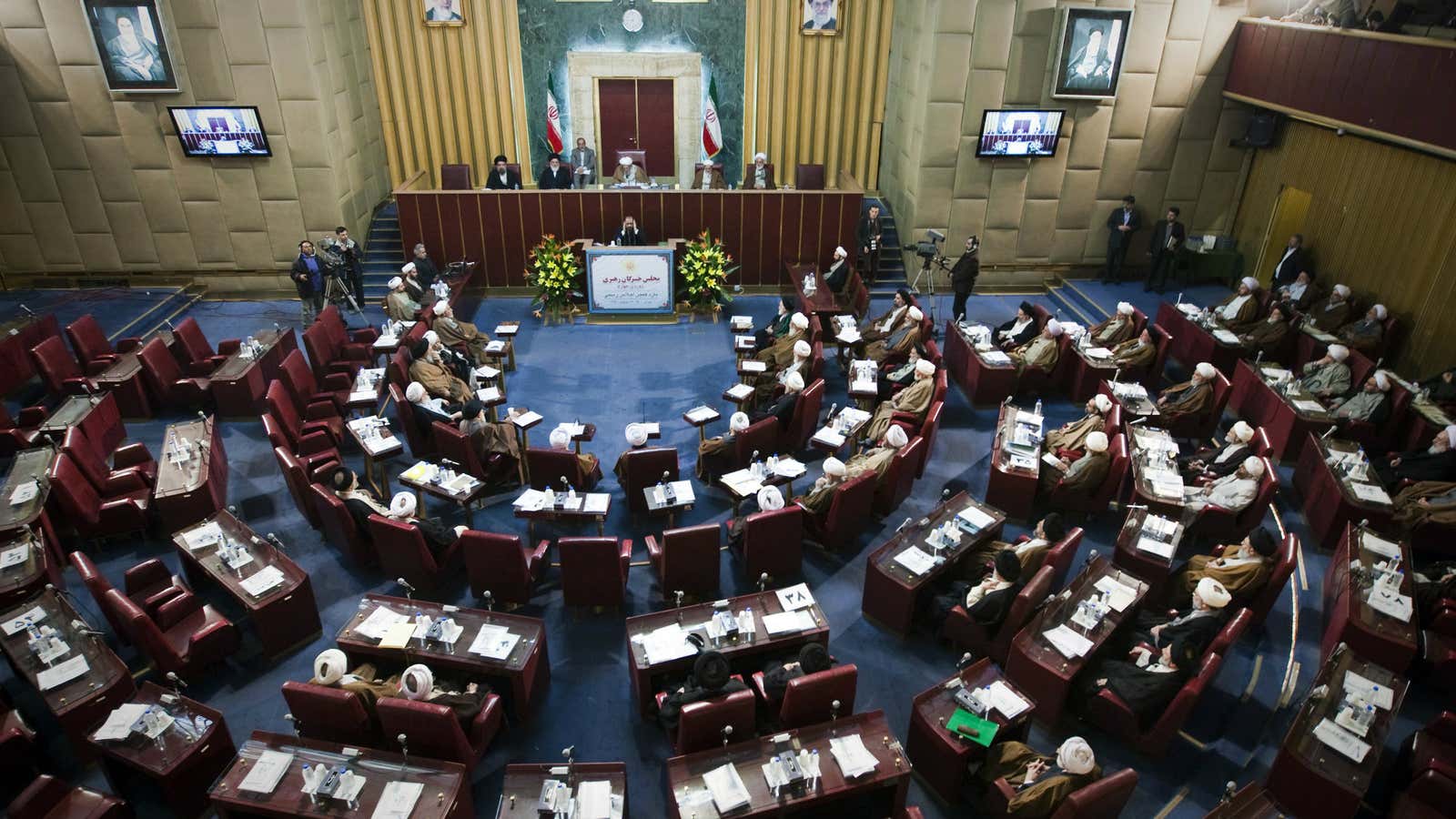Tehran, Iran
With barely more than two months to go before what may be the Islamic Republic’s most important elections in a generation, there are no visible signs of campaigning in the streets of Tehran. One reason: the Iranian political cycle is, perhaps mercifully, much shorter than the American one. But another reason emerges in my conversations with politicians, clerics, and businessmen. There’s no electioneering, at least not the kind you see in most democracies, because nobody can be entirely certain who is running.
Registration of candidates opens tomorrow, Dec 17. But the fate of many aspirants will be decided within a week—long before the voting begins—by a small group of clerics and jurists, known as the Guardian Council, who are constitutionally tasked to ensure that the Islamic Republic remains true to its religious ideals.
Under the Iranian system, candidates for any election must first be vetted by this 12-member body, which has, since the founding of the Islamic Republic, been controlled by the country’s Supreme Leader—first ayatollah Ruhollah Khomeini, and now ayatollah Ali Khamenei. The Guardians also have veto power over any legislation enacted by parliament, and most of the decisions of the country’s president.
This makes the Council a powerful instrument by which the Supreme Leader can head off political and social reforms at the pass, by preventing reformists from standing for elections, or perform an end-run around any attempted reforms by the legislative or executive branches.
Iran’s February elections are for two powerful institutions: the 290-member Majlis, or parliament, and the highly influential, 86-member Assembly of Experts. The latter is especially important this time around because its mandate is to select, supervise, and, at least in theory, remove the Supreme Leader. It has an eight-year term, twice the duration of parliament, so this particular Assembly will likely play the pivotal role of deciding who gets to succeed Khamenei.
The Supreme Leader is 76, and has battled cancer for years. In an interview this week, former president Akbar Hashemi Rafsanjani, said the process of finding a successor has already begun.
In theory, the Assembly is made up of clerics and theologians, whereas the Majlis is filled with politicians. But in a country where religion and politics are inextricably fused, the bodies often overlap. President Hassan Rouhani, for instance, was a member of the Assembly—and is expected to be a candidate again in February.
Even if he isn’t, the twin elections will in effect be a referendum on his performance since winning the 2013 presidential election, largely on the platform of reforms, by a landslide.
Rouhani has few reforms to show for his two years in power, but reformists are hoping that voters are inclined to reward him for the successful negotiation of a nuclear deal with the world powers. If that happens, they could win pluralities—and perhaps even majorities—in both the Majlis and the Assembly. This opens up just a glimmer of possibility that Khamenei’s successor could be appointed by a reformist-dominated Assembly.
Hardline conservatives, backed by the powerful Revolutionary Guards, are keen to ensure neither of those things happens: They have not exactly embraced the nuclear deal, and want no part of Rouhani’s reform agenda.
Next week will determine whether the two sides will get to duke it out at the polls—or if the Guardian Council fixes things beforehand.
The reformists are expecting the worst. As Grand Ayatollah Yousef Saanei, the most prominent reformist cleric, told me in Qom: “[The Council] will only allow candidates they like.” Like Saanei, Mohammed Taqi Fazel Meibodi, a reformist cleric who teaches at Qom’s Mofid University, is hoping that large numbers of reformists apply as candidates. That way, if the Council does tilt the playing field in favor of the hardliners, it will have to do so blatantly. “I don’t think the Leader will want to see the Guardians rejecting large numbers of applications,” Meibodi says. “That will be… difficult for him.”
I think the word he’s looking for is, “embarrassing.”
The historical record doesn’t allow for much optimism. Rouhani may have the political momentum on his side, especially if nuclear sanctions are removed in January, just ahead of the vote. But under Khamenei’s Supreme Leadership, the Guardians have shown little regard for the popular mood.
Perhaps in anticipation, Rouhani recently fired a rhetorical broadside at the Council, pointing out that the its function was to be “a supervisor,” implying that the body shouldn’t see its own role as that of an actor in Iranian politics. But the conservatives immediately fired back, with ayatollah Sadeq Amoli Larijani, the head of Iran’s judiciary, warning that “some [political] currents”—no prize for guessing which—were trying to “pressurize the Guardian Council.”
Hamidreza Taraghi, a prominent hardliner, dismisses the reformists fears. “It’s normal for a democracy to have a vetting process for candidates,” he tells me. “The Guardians don’t act whimsically, they act on the information provided to them [about the candidates] by the security services, the judiciary and the intelligence agencies.”
It just so happens, all three of those are controlled by the hardliners.




